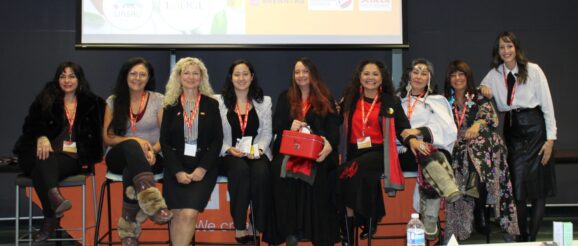‘Culture through entrepreneurship’: Beauty bootcamp highlights Indigenous innovation | Globalnews.ca

Bernice Clarke remembers wanting body butter but finding every option expensive. “Living here in the Arctic, it’s pretty dry — people have eczema, skin problems,” said Clarke, who’s Inuk from Iqaluit. “Eventually I started making body butter myself and making too much of it and thought — what am I going to do with it? “So I gifted it to my friends and they told me it was healing the bumps on the back of their arms — it’s great for a dry skin. So I was like, OK, I think we’re on to something.” That was 10 years ago. Flash forward, Uasau Soap has grown; Clarke’s husband is now involved and they’re selling other skincare products and including traditional Inuit medicines like bowhead oil and bearded seal oil. “It’s really empowered me to dive deeper into my culture and find other ways to integrate it into my business,” she said. And an Indigenous beauty bootcamp put on by Missisauga-based chemical company BASF Canada and Oklahoma-based accelerator StitchCrew gave her the opportunity to expand her business even further. She was the winner of a $10,000 USD grant and capstone award that will help her create a new product in collaboration with student chemists. The Indigenous beauty bootcamp started after BASF and StitchCrew ran a similar program south of the border — the only difference being Canada’s edition focuses on Indigenous businesses. “We felt that it was important to align this program with Canada’s commitment for diversity, equity and inclusion, as well as their commitment to Indigenous relations,” said Lili Cretu, account manager with BASF. “The program was designed to empower and uplift Indigenous entrepreneurs and offer participants hands-on coaching and mentorship sessions with industry leaders and an opportunity to pitch their brands.” Tribalure Canada Inc. was another business that participated in the Indigenous beauty bootcamp. Started by Cree-Algonquin duo Angie Sarsons and Denyse Nadon, the company was a dream 20 years in the making. After an unsuccessful launch in the early 2000s because of a lack of capital, the pair went their separate ways but never forgot about Tribalure. “In July 2022, we came back together through another project and we were like, ‘Do you still think of Tribalure? Yes! OK, let’s do it,” said Sarsons. “We knew we could do it because we had the resources, we had the experience, the negotiation skills, the leadership management — and if the pandemic taught us something it’s that you can do business long distance.” The pair walked away from the Indigenous beauty bootcamp winning the capstone prize which will help them create a new product with student chemists from Seneca Polytechnic in Toronto. “We want to move into skincare and we know we want our key ingredient to be the blueberry, we want to start with that and that comes from sacred knowledge ,” said Nadon, who is a member of Apitipi Anicinapek Nation. “We thought, if we’re going to put ourselves out in the world it had to come with our grandmothers — we have to bring that that piece into the skincare .” “This opportunity will allow us to start that in early May,” adds Sarsons. “The student chemists will help us develop our first skincare product using something that’s sacred to us.” The pair plan on moving forward in a good way and have even invited the student chemists to join them in a ceremony on their territory before getting started. “Business happens at the speed of trust, and that has to be from both sides where we both come together,” said Sarsons. “We both have something to offer, right? We use our teachings and we all have gifts to bring.” Clarke is also excited about what’s next. Her winnings will help take Uasau Soap international. “I know that being an entrepreneur, I have the ability to lead. I have an opportunity to work with youth, to work with elders and learn more of my culture through entrepreneurship,” she said. “The money we received will help us move into international waters, into areas we have not been able to get to. “Beauty bootcamp opened doors I couldn’t find the key for, connected us to the right people.” Through including bowhead oil and bearded seal oil, Clarke feels more connected to her culture. “When I started adding the bowhead, I started having Inuit tell me what a beautiful thing I was doing,” she said. Inuit aren’t allowed to freely hunt bowhead anymore because of its scarcity, so each year a lottery happens and every community puts in a ticket to try for it, so including bowhead oil in her products is huge. “It’s a big deal; it’s part of our culture bringing back what was taken,” she said. “The bowhead was our house, our fuel, our food, it was our community and it fed for so long.” Uasau Soap is for healing both the skin and the heart, explains Clarke. “My values as an Inuk are naturally a part of my business, which is, you know, taking care of others, sharing, taking, being with community and thinking how, how can I help?” Both businesses, while different, feel similarly about prioritizing their people and culture. “We want to be a legacy, we want to instill that hope,” said Sarsons. “I’m not going to pretend that (trauma) wasn’t part of my life but what I do know is that you can rise above that. “We want women and girls that are going to be watching us to know that they can do it to whatever is in their heart, whatever seed, their passion, they can do it.”
